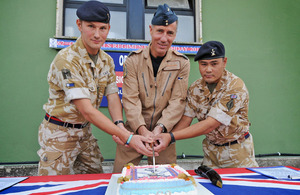Queen's Gurkha Signals mark anniversary on Op ELLAMY
Members of the Queen's Gurkha Signals from 22 Signal Regiment, currently based at Gioia del Colle air base in southern Italy, recently celebrated the unit's birthday.

Members of the Queen's Gurkha Signals from 22 Signal Regiment cut their birthday cake [Picture: Corporal Pete Devine, Crown Copyright/MOD 2011]
The detachment is serving with the RAF in support of NATO’s Operation UNIFIED PROTECTOR, aimed at protecting the civilian population of Libya from attack or threat of attack by Gaddafi’s former regime. They provide essential communication systems as part of NATO’s Allied Rapid Reaction Corps.
Lieutenant Cave, Officer in Charge of the 248 Gurkha Signal Squadron detachment, and Sergeant Lalit, second-in-command of the detachment, opened the celebrations with a speech first made by Major General Perowne in 1954. Lieutenant Cave read the speech in English; however, in an apt twist, Sergeant Lalit then read the speech in Nepali:
By your badge men shall know you. By your loyalty, by your behaviour and by your technical skill they will judge you as men and measure your efficiency as soldiers…
During its formation in 1948 all men were titled Gurkha Royal Signals and wore the badge of the Royal Corps of Signals, known as ‘Jimmy’. On 23 September 1954, Major General Perowne presented the unit with their own cap badge and since that day the regiment celebrates its birthday on 23 September.
In true Gurkha fashion, the celebratory birthday cake was cut using an authentic kukri - a curved Nepalese knife, similar to a machete, traditionally used as both a tool and a weapon.
Officer Commanding 906 Expeditionary Air Wing (EAW), Group Captain Squires, paid tribute to their efforts:
248 Gurkha Signal Squadron personnel from 22 Signal Regiment have been pivotal to the provision of key battle-winning communications at all three EAW locations. I am extremely proud to be their operational commander and never more so on the regiment’s birthday.
The charity monies they have raised through numerous ingenious endeavours is exceptional for such a small team and they are a credit to their regiment and the British Army.
To conclude the ceremony, Lance Corporal Sunil Rai presented a cheque to the 906 EAW Chief of Staff for 500 euros in aid of Help for Heroes and the Gurkha Welfare Trust - money raised by 248 Gurkha Signal Squadron over the course of their deployment by providing hair-cutting services to personnel on detachment.
Sergeant Vijay Raj Ghale said:
It just started off with us cutting each other’s hair, because when you’re on detachment for over four months you need to get your hair cut. Then loads of other guys saw us doing it and asked if we could cut their hair too, so we decided that we would charge about three or four euros a haircut and donate all the money to charity.
The Queen’s Gurkha Signals (QGS) is a regular unit of the Royal Corps of Signals and forms part of the Brigade of Gurkhas in the British Army. They were first formed during the Malayan Emergency to support the 17th Gurkha Infantry Division. Their history is rich and they command respect from all quarters; indeed, the Chief of the Defence Staff, and also Colonel Commandant of the Brigade of Gurkhas, General Sir David Richards, paid homage to them on a recent visit to the air base:
I know there are some Army here, including my own dear Gurkhas, and it’s great to see you here because this is not just an air effort,” he said.
Tucking into some traditional Nepalese cuisine, Lance Corporal Agnesh Rai summed up the feelings of many who serve with the QGS:
My family in Nepal are very proud that I’m in the Queen’s Gurkha Signals and I am proud to serve,” he said.